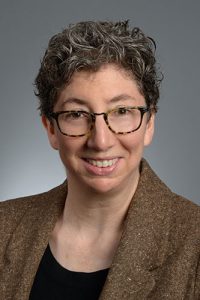
PhD
Professor
Science Education
Biochemistry
Education
| BA | Biology | Haverford College | Haverford, Pa. |
| MA | Integrative Biology | University of California, Berkeley | Berkeley, Calif. |
| PhD | Science Education | University of California, Berkeley | Berkeley, Calif. |
Research Areas
Students’ use of scientific evidence, instructional decision making, classroom assessment, English language learners, design of instructional materials.
Research Description
Dr. Siegel’s current research focuses on a key obstacle and point of leverage for enhancing learning, teaching and equity–assessment. My research program in secondary and postsecondary education is organized along three strands:
- Designing effective and equitable assessments;
- Assessing learning and decision making, and;
- Investigating and supporting teachers’ assessment practices.
My research team aims to push the boundaries of how to theorize about and practically implement assessment. Assessments have a large impact on what students and teachers learn in a classroom and who succeeds. Our work has refined and studied the effects of assessments in middle school life science with a focus on creating more equitable assessments for English language learners. With funding from the National Science Foundation, we are investigating ways to support preservice teachers in developing next generation curricular and assessment materials. My team is currently investigating a barrier to developing a diverse teacher workforce: a state certification test. This study articulates transformative visions for science assessment researchers and reflects on ways that my team of researchers investigated and negotiated this barrier.
Teaching
Since 2010, Dr. Siegel has expanded the popular, interdisciplinary series to support undergraduate instruction on campus — Sandra K. Abell Conversations about College Science Teaching. She teaches classes on assessment research, science education research, secondary science teaching, biotechnology and the scholarship of teaching for future science faculty.
Notable Honors and Service
- Governor’s Award for Excellence in Teaching, Missouri, 2019
One faculty member from each higher education institution is selected for state-wide recognition per year. - Alumnae Anniversary Award,University of Missouri, 2019
Recognizes women faculty for their teaching excellence or contributions to the education of women - Faculty Leadership Fellow, College of Education, 2018-2019
- Research in Biology Education Award, National Association of Biology Teachers, 2016
- Graduate Instructor of the Year, College of Education, 2014-2015
- Isabelle Lyda Professor, University of Missouri, College of Education, 2009-2011
- National Institute for Science Education Fellow, University of Wisconsin-Madison, 1999-2001
- National Science Foundation’s Reforming Education through Science and Design Traineeship Program, Fellowship, University of California, Berkeley, 1998-1999
- National Science Foundation’s Center for the Study of Critical Transitions, Research Grant for graduate study, University of California, Berkeley, 1997-1998
Selected Publications
Siegel, M.A.*, Birt, J.A.*, Khajeloo, M.*, Rega-Brodsky, C.C.*, Hancock, T.S., Cummings, K., & Nguyen, P.D. (in press, 2019). Going against the grain: Enacting reform-based ideas in college science teaching. Science Education. *Equal first-author contribution
Izci, K., & Siegel, M.A. (2019). Investigation of an alternatively certified new high school chemistry teacher’s assessment literacy. International Journal of Education in Mathematics, Science and Technology (IJEMST), 7(1), 1-19. DOI: 10.18404/ijemst.473605
Wisch, J.K., Farrell, E., Siegel, M. A. & Freyermuth, S.K. (2018). Misconceptions and persistence: Resources for targeting alternative conceptions in biotechnology. Biochemistry and Molecular Biology Education, November, 602-611.
Murakami, C. D. & Siegel, M. A. (2017). Becoming Bermuda Grass: Mapping and tracing rhizomes to practice reflexivity. Cultural Studies of Science Education. Online First: 10.1007/s11422-016-9803-z.
Murakami, C. D., Hendrickson, M. K., & Siegel, M. A. (2017). Wicked problems in sustainable agriculture education: A case study. Agriculture and Human Values, 34(3), 591-606.
Siegel MA, Menon D, Sinha S, Promyod N, Wissehr C, Halverson KL. (2015). Equitable written science assessments for English Language Learners: How scaffolding helps. Journal of Science Teacher Education. 25, 681-708.
Siegel MA, Roberts TM, Freyermuth SK, Witzig SB, Izci K. (2015) Aligning assessment to instruction: Collaborative group testing in large enrollment science classes. Journal of College Science Teaching. 44(6), 75-82.
Nguyen PD, Siegel MA. (2015). Community action projects: Applying biotechnology in the real world. The American Biology Teacher. 77(4), 241-247.
Siegel, M.A. (2014). Developing preservice science teachers’ expertise in equitable assessment. Journal of Science Teacher Education. 25(3), 289-308.
Witzig, S.B., Freyermuth, S.K., Siegel, M.A., Izci, K., & Pires, J.C. (2013). Is DNA alive? A study of conceptual change through targeted instruction. Research in Science Education, 43, 1361-1375.
Abell, S.K., & Siegel, M.A. (2011). Assessment literacy: What science teachers need to know and be able to do. In D. Corrigan, J. Dillon, & R. Gunstone (Eds.), The Professional Knowledge Base of Science Teaching.London, UK: Springer, 205-221.
Rebello, C. M., Witzig, S. B., Siegel, M. A., & Freyermuth, S. K. (2011). Assessment practices for understanding science-related attitudes. In M. I. Saleh & M. S. Khine (Eds.), Attitude research in science education: Classic and contemporary measurements (pp. 199-218). United States of America: Information Age Publishing.
Siegel, M.A. (2007). Striving for equitable classroom assessments for linguistic minorities: Strategies for and effects of revising life science items. Journal of Research in Science Teaching, 44 (6), 864-881.
Siegel, M.A., Mlynarczyk-Evans, S., Brenner, T.J., & Nielsen, K.M. (2005). A natural selection: Partnering teachers and scientists in the classroom laboratory creates a dynamic learning community. The Science Teacher, 72 (7), 42-45.
Current Funding
PI, Transforming Natural Sciences at Mizzou: Retain, Belong, Lead, THRIVE
Co-PIs: Terrell Morton, Charlie Nilon, Johannes Schul, Jim Spain
Funded by the Howard Hughes Medical Institute, Inclusive Excellence program, $1,000,000
Co-PI, Wipro Science Education Fellows Program
PI: Meera Chandrasekhar
Co-PIs: Karen King, Dorina Kostzin, Marcelle Siegel
Funded by the WiPro Foundation, $1,100,001
Co-PI, Building a Campus-Wide STEM-Education Reform Network from the Ground Up
PIs: Johannes Schul, Sarah Bush
Co-PIs: Marcelle Siegel, Dorina Kostzin, Brenda Peculis, Alan Whittington, et al.
Funded by Association of American Universities (AAU)/Undergraduate STEM Education Initiative: AAU STEM Network Mini-Grant, $20,000 + $20,000 internal.